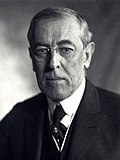| |||||||||||||||||||||||||||||||||
| |||||||||||||||||||||||||||||||||
 County Results
| |||||||||||||||||||||||||||||||||
| |||||||||||||||||||||||||||||||||
| Elections in Washington |
|---|
 |
The 1916 United States presidential election in Washington took place on November 2, 1920, as part of the 1916 United States presidential election in which all contemporary 48 states participated. Voters chose seven electors to represent them in the Electoral College via a popular vote pitting Democratic incumbents Woodrow Wilson Thomas R. Marshall, against Republican challengers Associate Justice Charles Evans Hughes and his running mate, former Vice-President Charles W. Fairbanks.
Washington had been a one-party Republican bastion for twenty years before this election.[1] Democratic representation in the Washington legislature would during this period at times be countable on one hand,[2] and neither Alton B. Parker nor William Jennings Bryan in his third presidential run carried even one county in the state. Republican primaries had taken over as the chief mode of political competition when introduced in the late 1900s.[3]
However, a powerful "peace vote" in the Western states[4] due to opposition to participation in World War I, and the transfer of a considerable part of the substantial vote for Eugene Debs from the previous election to Wilson owing to such Progressive reforms as the Sixteenth and Seventeenth Amendments[5] allowed Woodrow Wilson to carry Washington by a 4.25 percentage point margin. In doing this, Wilson was the first ever Democratic victor in the Western Washington Puget Sound counties of Island, San Juan and Kitsap,[6] and the only Democrat between 1904 and 1924 to carry any Washington county in a two-way presidential race.
After the votes were counted, there was some debate over who should be the seventh elector from the state. One of the original electors on the Democratic ticket, A. T. Steam, died prior to election day. The state's Democratic party replaced him with Edwin M. Connor, but Stream's name was not replaced on the ballot in ten of Washington's 39 counties.[7][8] Since voters chose electors directly at the time, this resulted in a split of the vote between Connor and Steam and a Republican elector, Warren H. Lewis, received the seventh-most votes and therefore would be entitled to the final elector position and subsequently cast a vote for Charles Evans Hughes. Many believed, however, that given the voters' clear intent to elect Wilson and Washington's potential split not affecting the final outcome, Lewis should either cast his electoral vote for the Wilson ticket or step aside and allow Connor to be appointed the seventh elector. After consulting with the state's Republican committee, Lewis declined to contest Connor's appointment as elector.[9][10] As such, all seven of Washington's electoral votes were cast for Wilson and Marshall.
- ^ Burnham, Walter Dean; ‘The System of 1896’, in Kleppner, Paul (editor), The Evolution of American Electoral Systems, pp. 176-179 ISBN 0313213798
- ^ Schattschneider, Elmer Eric; The Semisovereign People: A Realist's View of Democracy in America, pp. 76-84 ISBN 0030133661
- ^ Murray, Keith; ‘Issues and Personalities of Pacific Northwest Politics, 1889-1950’, The Pacific Northwest Quarterly, vol. 41, no. 3 (July 1950), pp. 213-233
- ^ Menendez, Albert J.; The Geography of Presidential Elections in the United States, 1868-2004, p. 47 ISBN 0786422173
- ^ Sarasohn, David; 'The Election of 1916: Realigning the Rockies', Western Historical Quarterly, Vol. 11, No. 3 (July 1980), pp. 285-305
- ^ Menendez, The Geography of Presidential Elections in the United States, p. 332
- ^ Washington Secretary of State. Abstract of Votes Polled in the State of Washington at the General Election Held November 7, 1916. Olympia, Washington. pp. 6–10.
- ^ Washington Secretary of State. Second Biennial Report Election Division. Olympia, Washington. pp. 84–88. Retrieved July 30, 2024.
- ^ "Interesting Happenings in Pacific Northwest". Washington Digital Newspapers. The Leavenworth Echo. January 12, 1917. Retrieved July 30, 2024.
- ^ "To The Spotlight, Mr. Connor!". Washington Digital Newspapers. Washington Standard. January 5, 1917. Retrieved July 30, 2024.


